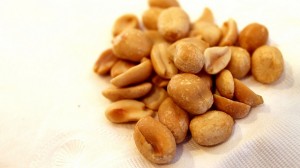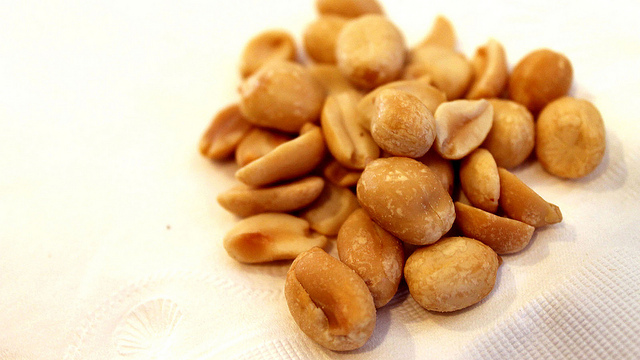A research team at Oxford University recently conducted a study to determine what conditions are more likely to trigger an allergic reaction to nuts in mice. The team used roasted peanuts and raw (regular) peanuts, purifying the proteins from both and then introducing the 2 types of peanut proteins multiple ways.
The response was shocking: the mice who were exposed to dry roasted peanut proteins had many more immune responses than the mice exposed to raw peanut proteins. This “immune response” closely resembles a human allergic reaction.
 The actual act of roasting peanuts seems like it wouldn’t change much other than taste, but the science of the act shows that with heat, the proteins are chemically modified. The common concept of enzyme performance being altered by changing the temperature or pH applied in this experience. Peanuts contain the enzyme Cyp11a1, a recurring link in allergic reactions. When heat was applied to the protein of a peanut, the enzyme’s shape changed and therefore the active site was altered and the enzyme was unable to perform its function. Therefore, an allergic reaction to the heat-modified (roasted) nuts was more easily triggered.
The actual act of roasting peanuts seems like it wouldn’t change much other than taste, but the science of the act shows that with heat, the proteins are chemically modified. The common concept of enzyme performance being altered by changing the temperature or pH applied in this experience. Peanuts contain the enzyme Cyp11a1, a recurring link in allergic reactions. When heat was applied to the protein of a peanut, the enzyme’s shape changed and therefore the active site was altered and the enzyme was unable to perform its function. Therefore, an allergic reaction to the heat-modified (roasted) nuts was more easily triggered.
Being someone who suffers from a nut allergy (I know, I’m missing out on Nutella), I found this article very interesting because I’ve experienced certain situation with inconsistent reaction triggers, and I’m curious as to what they might be. I also found the geographical link regarding the allergy outstanding – the Western population of nut allergies is reportedly much higher than that of the Eastern population, but in the article, the distinction is made that as Westerners, we tend to eat our peanuts roasted/dry-roasted, whereas the Eastern population is likely to eat their food raw.
Photo by: Daniella Segura ; Some Rights Reserved https://creativecommons.org/licenses/by/2.0/
Source: http://www.sciencedaily.com/releases/2014/09/140921223617.htm


ekauli
This topic is especially interesting to me, like those above, because of my numerous allergies. Reading herarst’s that comment where you connected the dots caused me to connect the dots, with regard to denaturation of protein due to environmental conditions. It really is proof that we can see biology concepts in our everyday lives. I can testify to the mice responding differently to the cooked peanuts because it is similar with me and carrots: I can’t eat raw carrots but am just fine when they are all boiled and soft. So if the denaturation of proteins can cause us not to have an immune response, is that a way we can attack allergies? This study explores this idea, and though it wasn’t conclusive, it probably wouldn’t hurt to have more research into it. http://www.sciencedirect.com/science/article/pii/S0278691515000848
AllergyEasy
Those who suffer from nut allergies will learn many things from this article. Glad to know that many people are still giving importance on studying about nut allergies and how to treat it.
herarst
I’ve never made the connection of heating up food and causing denaturation in the protein structure. It shows that what we learn in biology really does play a role in our everyday lives. I wonder what the correlation between tree nuts and peanuts are? According to http://www.foodallergy.org/allergens/peanut-allergy, around 40% of people with peanut allergies are also allergic to tree nuts. Does overexposure to nuts play a role?
mitokahndria
Great article Julia!! I still find it so interesting how someone could simply eat a peanut and have an allergic reaction to it that could kill them! And the difference between airborne reactions versus a reaction from consuming the food. Regarding your article, do you think that someone with a peanut allergy would be able to consume raw peanuts but no roasted peanuts?
Also, I found in this article – http://www.mayoclinic.org/diseases-conditions/peanut-allergy/basics/causes/con-20027898 – that it is possible to have a food intolerance as opposed to a food allergy. It stated that with food allergies, consuming tiny amounts of the food can cause a severe reaction, whereas someone who has a food intolerance can eat small amounts of the food and experience mild symptoms (indigestion or heartburn).
I wonder if in some cases, people are not completely allergic but just have an intolerance. For example, I am not allergic to dairy, but I am lactose intolerant.
gherloniapparatus
Great article, Nicheloss! This topic is so interesting especially because, like you recognized, people can have different reactions to peanuts based on their specific allergy and certain situations. I found a cool site that can help us further understand the different symptoms and affects of nut allergies. http://www.healthline.com/health-slideshow/nut-allergy-symptoms#newsletterSlide
However, I had never realized that there can also be different triggers based on the chemical makeup of one certain nut, such as roasting. I wonder what other kinds of chemical changes there are that a nut undergoes that can affect the reaction of an allergy, and how each type can change the enzymatic and immune response.